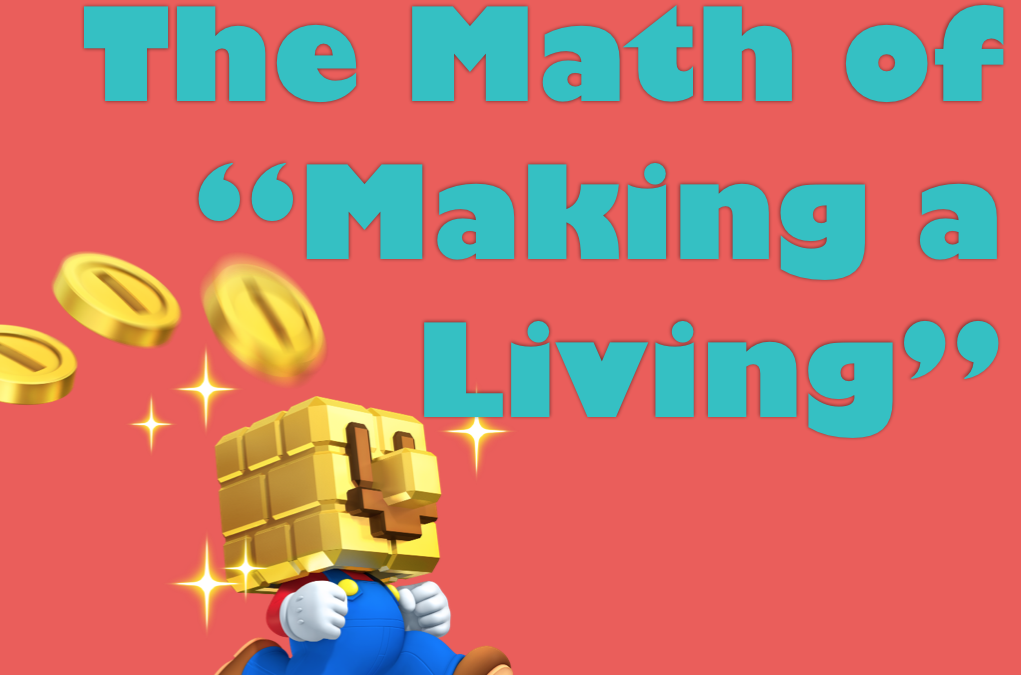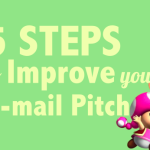At one point or another, we’ve all probably been caught saying that we want to “make a living” doing what we love. But what does that mean, exactly? At what point am I making a living off of my music? In this post, I’m going to show you how to reverse-engineer your income to help keep you on-target with your financial goals during your day-to-day work.
Begin with a Vision for your Video Game Music Career
If you’ve done your homework and have set a deliberate monetary goal for yourself, you probably have either a monthly or annual amount of money you’d like to be bringing in. Even if you know you’re not where you want to be, it’s critical that you actually define that “where you want to be” point so you know how far off you are and – eventually – when you’ve reached your goal.
Let’s say for sake of argument (and this post) that you’d like to simply replace your existing job with a full-time career as a game audio composer. You could easily just use your existing salary as the benchmark for how much money you need to generate, but it’s advantageous to actually sit down and do some of the math on what your expenses look like. The reason? Not only can your salary amount change year-to-year and job-to-job, but it’s a lazy number to use. If you write out a list of your expenses (I prefer using a monthly number) and add it up, you have the real number of what you need to cost at minimum per month.
Step 1: Figuring Out What You Need
Get 1 sheet of paper and a writing utensil. Right now. Make a list of everything you have to pay for – rent/mortgage, cell phone bill, groceries, car insurance or commuter expenses, gas, utilities, medications, etc – and add up the total to get your monthly expense number. This may induce a minor panic attack, but you’ll be better off for it if you’ve never done this step. Not only will this help you identify your target monthly income goal, but it will also provide you a benchmark to compare with your monthly SPENDING. I had a friend who signed up for Mint.com – a fantastic, free personal finance tool – only to realize he had been spending hundreds of dollars per month on cab fare and coffee at Starbucks without realizing it. Oops.
Step 2: Simple Math + Pricing Your Game Audio Services
Easy step, here – multiply your monthly income number by 12 to get your annual income target. Divide that number by 50 (there are 52 weeks in a year, and you deserve at least 2 weeks of vacation, don’t you?) to get your target weekly income number. For example, $50,000/year = $4,167/month or ~$1,000/week of work.
Now that you know how much you need to be generating on average, you can take a look at how you’re billing your services – either by hour, by finished minutes-of-music, or on a project basis – and make sure you aren’t digging yourself into a ditch. Taking on a project that’s going to consume your life for 2 weeks straight due to a tight deadline? You’ll need to generate at least $2,000 with that project to get yourself on-target for your goals – IF you’re looking to make full-time money. You may not be skilled enough to demand this price yet, but as soon as you are you need to keep this number at the forefront of your mind before taking on new work.
Keep in mind that there are multiple possible revenue sources for composers, including: profit-sharing (owning a % of the game sales), royalties (rare), music sales (if you retain the rights or get a % of those profits),
Step 3: Keeping it Real
Many developers are likely expecting to pay a flat-rate fee for the project, and that number will likely be based on 1 or 2 numbers: how many finished minutes of music they need for the game, what they are able/willing to actually spend, or some balance of the two. Additionally, you may or may not be able/ready to command fees that will bring in $1,000/week, and that’s OK! Keep in mind, however, how long it’s really going to take you to create the music required.
You’ll want to take an honest look at how long it takes you to produce a finished minute of music and factor that into your math to make sure you aren’t over-burdening yourself. It’s cool to take some time working up to your ideal target fees, but it’s never cool to take on too much work at once and miss a deadline as a result. At the end of the day, you want to make sure you AND the game developer feels that the price you’re paid is a fair one – and that number will be different for different people.
If you value your time (and I hope you do), make sure you feel valued by people paying for it. One of the biggest mistakes that new entrepreneurs and business owners make is undervaluing themselves and their skills. If you suck at making electronic music but want to give it a shot, maybe you’ll accept a very low fee or do your first project in this genre for free. If you’re pretty good at composing orchestral battle music, on the other hand, make sure to respect your own time and value enough to ask for a fair price – and get comfortable with turning down the work if the price doesn’t feel right.
How close are you to “making a living” off of your music? Have you done the math? If you have any questions or comments, feel free to share in the comments below!










This was extremely useful! Thank you.
Great and useful article! I never thought about this ‘Math’ before haha. Thank you so much!
Exactly! It’s very easy to lose sight of the forest through the trees in your business.
Well, I was going to write a blog post about this on my website but now I don’t need to; I can just link to your blog! Very simple and easily to understand. Well done!
this is a real eye opener, thank you for sharing!
You’re welcome, Josh! Glad you found it useful.